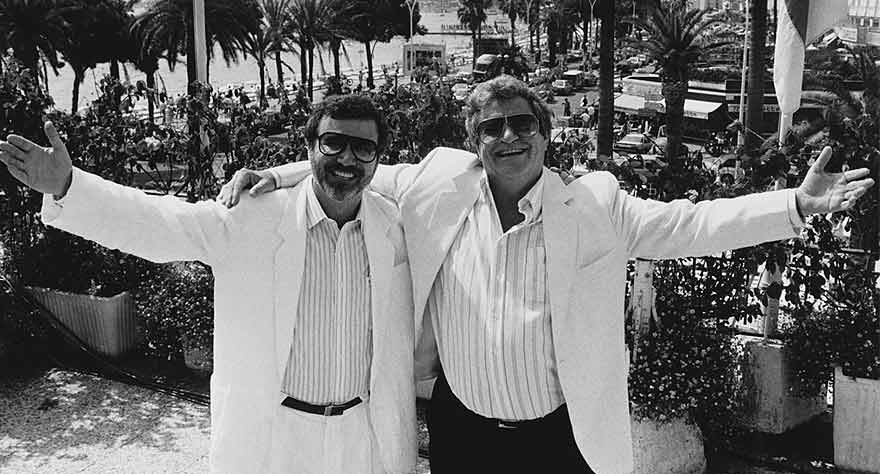
This decent documentary looks at the meteoric rise and precipitous fall of a legendary '80s movie studio.

This decent documentary looks at the meteoric rise and precipitous fall of a legendary '80s movie studio.
Another piece of history is screening at the Toronto Jewish Film Festival, only this time it’s personal (at least for me). Where other films have offered tales of Jewish history I’ve heard or read about (or perhaps lived through to a certain extent), this documentary offers history I like to think I helped make. How? Countless VHS rentals in the decade of my youth: the glorious 1980’s. Making its Toronto première is Hilla Medalia’s The Go-Go Boys: The Inside Story of Cannon Films.
Menahem Golan was the skinny kid in school who got picked on all the time, so he turned to amateur moviemaking to set himself apart from the others. When he screened his first film for free, no one showed. When he screened it again, he offered a penny to every person who came out. He packed the place. A calling was answered.
Fast-forward to 1960’s Tel Aviv and Golan is in the moviemaking business. One day his uncle calls him with a problem. Golan’s first cousin, Yoram Globus, is a whiz with numbers but an undisciplined student. Globus’ father calls Golan and asks for help, so Golan tells his uncle to send his younger cousin to Tel Aviv. It turns out Globus is a natural on the finance side of moviemaking. A partnership is born.
The duo go on to have hits, they learn from their misses, and they eventually become the filmmaking force in Israel. When they produce a mega-hit in Lemon Popsicle, they know it’s time to invade Hollywood. The Go-Go Boys: The Inside Story of Cannon Films looks at the meteoric rise of Golan/Globus, pauses to bask in its heyday, and then covers its precipitous fall.
As a nostalgia piece for film buffs who were raised in the “Be Kind, Rewind” era, this is a terrific film. Not only does it cover the studio’s amazing history, it contain countless clips from the Cannon library: a collection that boasts ’80s staples like New Year’s Evil, The Last American Virgin, King Solomon’s Mines, American Ninja, and all the Chucks (Bronson and Norris) you can wave a loaded weapon at. Also working for it is that the film is jammed with news footage about Cannon from the era. This footage, well-chosen by Medalia and well-integrated by editor Daniel Sivan, really puts the viewer in the era and allows for an entire decade to be experienced in less than 90 minutes.
Medalia also does well to capture the excitement and entrepreneurial feel of the time. Cannon’s approach to filmmaking was pedal-to-the-floor; if a film pitch was good enough, the machine went to work and the movie got made, with a lather-rinse-repeat process that reached a point where Cannon was producing more films in one year than some studios would produce in ten. This also lent to the company’s demise, however, as so much effort was focused on generating new content, the content they were in the middle of making was never properly shepherded.
As a documentary, the film is shaky. Medalia is wise to spend brief, efficient time on the early Israeli days of Golan and Globus, but her coverage of Cannon’s demise ironically falls victim to a pedal-to-the-floor approach. There is a point in the timeline when the company’s midas touch fails them, when their business model can no longer bear the weight of rising production costs. It’s here the film accelerates much too quickly. The split of these two giants of Hollywood—for whom the Cannes Film Festival was nicknamed the Cannon Film Festival—is barely detailed, and the breakdown of the relationship almost feels like it was a singular moment, not a gradual degradation. The post-Cannon lives of Golan and Globus are also mostly staccato items—bullet-points that give the viewer the idea of what happened instead of telling the story of what happened. There is real drama in all of this, but Medalia doesn’t capture it.
The other major deficiency of the film is how the extended Golan/Globus family was impacted by the cousins’ work ethic, unforgiving schedule, and ultimate collapse. Several family members, including now-grown children, are featured, but their recollections are reduced to a handful of soundbites that fail to resonate.
Overall, The Go-Go Boys: The Inside Story of Cannon Films is an enjoyable watch highlighted by great clips, a terrific story of the first time Golan met Jean-Claude Van Damme, an unintentional series of impersonations of Golan that everyone seems to do (and do well), and a wonderful trip down memory lane.